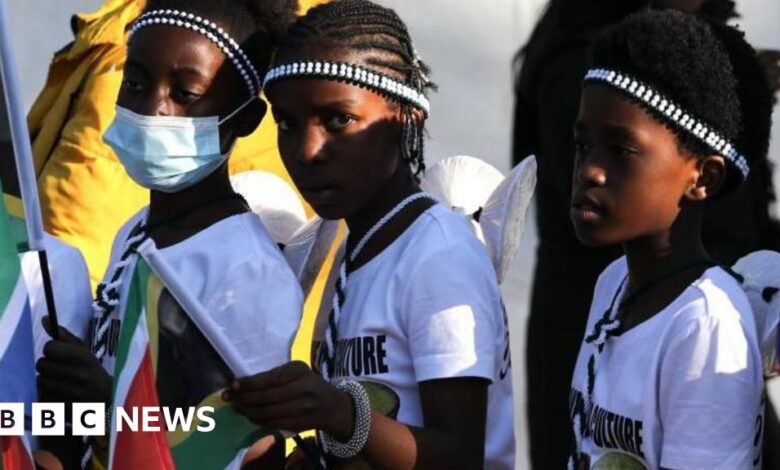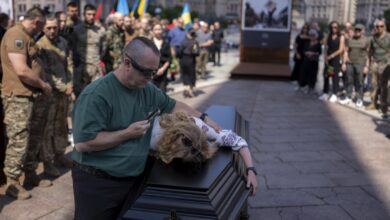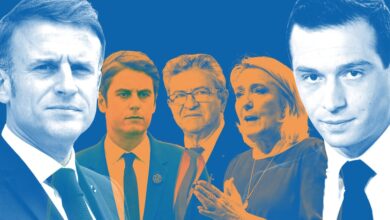South Africa’s cabinet: The winners and losers in Cyril Ramaphosa’s government

[ad_1]
Mr Ramaphosa kept all the economic portfolios for the ANC, dropping plans to give the trade and industry ministry to the DA after strong resistance from within his party, as well as the black business lobby and the trade union movement.
They believed that handing the portfolio to the DA would undermine the ANC’s black economic empowerment policies. The pro-free market DA opposes the policies, arguing that they stifle investment, fuel corruption and simply enrich the ANC’s business cronies.
In his regular column on the TimesLive news site, former Business Day editor Peter Bruce said the ANC’s top brass “couldn’t bear the prospect of the DA anywhere near the economic levers”, forcing Mr Steenhuisen to settle for agriculture in a “mediocre trade” for the trade and industry ministry.
Political analyst Ongama Mtimke told the BBC that the portfolios retained by the ANC were important in tackling racial inequality, and Mr Ramaphosa’s choices were intended to “show to the comrades that we are still on track as far as advancing the revolution is concerned”.
But Mr Fakude said the ANC and DA were likely to find enough common ground on economic policy.
The ANC had shifted to the centre since it took power three decades ago, though it might still disagree with the DA over issues such as privatisation, Mr Fakude said, adding: “Other than that I think they do share a lot of things in common.”
Mr Ramaphosa gave the DA other key portfolios – including basic education in a nation where literacy levels are low and language policy in schools is a deeply emotive issue, public works and infrastructure, and home affairs.
The latter is seen as a political hot potato – as Mr Fakude pointed out, it “deals with the borders and illegal African immigration into South Africa”.
The public works department has been embroiled in several corruption scandals and the DA has vowed a “zero-tolerance” approach to tackle the problem.
Mr Ramaphosa gave two portfolios to the Inkatha Freedom Party (IFP). Though allied with the DA, the party has adopted a neutral posture since the poll, and urged the two big parties to resolve their differences as they haggled over the cabinet’s composition.
Mr Ramaphosa gave its leader Velenkosini Hlabisa the ministry of cooperative governance and traditional affairs. The IFP is close to the Zulu monarchy, with Mr Hlabisa’s appointment seen as another move by Mr Ramaphosa to neutralise the threat posed by Mr Zuma, who has called for greater powers to be given to South Africa’s largely ceremonial monarchs and chiefs.
Mr Ramaphosa also gave the all-important police ministry to an ANC leader from Mr Zuma’s home province of KwaZulu-Natal, which has a long history of political violence.
Senzo Mchunu succeeds another ANC leader from KwaZulu-Natal, Bheki Cele, who was not re-elected.
Mr Cele largely failed to contain violence in the province, with more than 300 people killed in riots following the imprisonment of Mr Zuma in 2021 for contempt of court after he defied an order to cooperate with a commission of inquiry into corruption during his presidency.
KwaZulu-Natal is likely to face a renewed threat of unrest when Mr Zuma goes on trial, expected to be next year, on charges of corruption over an arms deal negotiated in the 1990s.
Mr Zuma denies any wrongdoing, and sees the case as politically motivated.
Having deep animosity for Mr Ramaphosa who ousted him as president in 2018, the former president campaigned for MK after breaking ranks with the ANC last December.
He led MK into coming third in the election, playing a major role in depriving the ANC of its parliamentary majority.
With the ANC and DA now joined at the hip, MK will assume the role of the official opposition, setting the scene for fierce confrontation with the ANC and its new coalition partners.
[ad_2]
Source link




